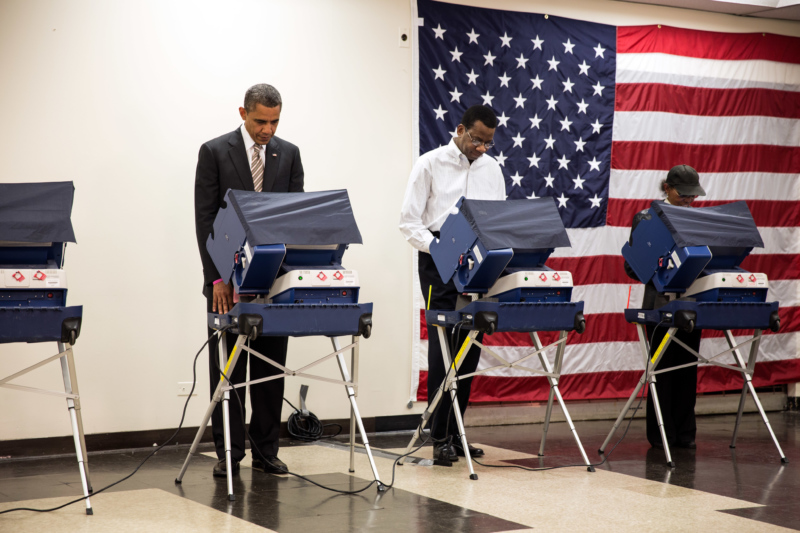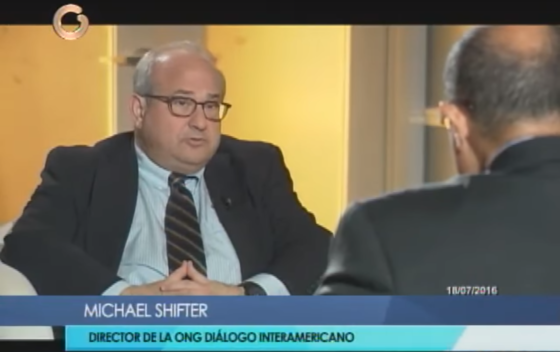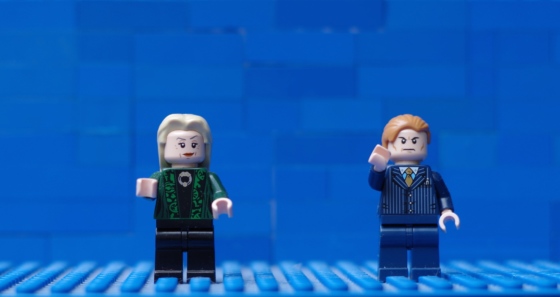
Will Congress Unravel the Trans-Pacific Partnership?
How will election-year politics play into the TPP’s future? What steps can supporters of the accord take to help secure passage?
This post is also available in: Español
Commenting on the final days of the US electoral campaign, First Lady Michelle Obama declared “this is not politics as usual". The election, now less than three weeks away, has produced what may be the most bizarre, confrontational, and malicious period in recent US political history. Issues, policies, and experience have hardly mattered as the campaign offered round after round of personal insults, accusations of illegal and unsavory behavior, and damning indictments of US leaders and institutions. The presidential race has been more of a bar-room argument than a serious political contest for the leadership of the world’s richest and most powerful country. Trump has threatened to challenge the legitimacy of the election, claiming that contest has been rigged in Hillary Clinton’s favor, and stating that he might refuse to accept any outcome but his own triumph.
The campaign has left the US electorate anxious and fearful, and the nation bitterly divided along lines of class, education, gender, race and geography. All this could, in the end, be a mere aberration with politics returning to normal in the coming period. Or it could dramatically alter US politics and the nature of political leadership in the country, as well as America’s role in world affairs.
Polling data indicate that Clinton now holds an overwhelming, but not insurmountable lead over Trump. She is now widely expected to assume the presidency in January, while Trump and the Republican Party are already steeling themselves for an impending defeat. Clinton is a political insider, an establishment candidate with a long, prominent career in public life, as a first lady, senator, and secretary of state. If elected, she is expected largely to pursue the agenda of the Obama administration, although perhaps with somewhat more aggressive foreign and security policies. Her opponent is the outsider, a political novice, a billionaire businessman, a television celebrity, who has never run for office or worked outside the private sector.
Trump paints a universally dark picture of the United States today, highlighting its incompetent leadership, deteriorating institutions, public and private, declining social and moral standards, and many foreign policy failures. With the slogan “Make America Great Again”, he sounds the alarm about the need radical change in way the US manages its economy, other domestic affairs, and global relations—in order to restore the US to its past glory, which so many Americans are sure once existed.
The electoral campaign has already rocked American politics and altered long held views of other countries about the US. And it will importantly shape and constrain the agenda of a new Clinton administration, if as widely predicted, she wins the election. Although now unlikely, many are convinced that a Trump victory could produce a virtual tectonic shift in American politics and policies, and lead to untold consequences across the globe.
Why then has the American election has taken such an unusual turn? How will politics and governance in the US be affected? And what are the implications for US foreign policy, particularly in Latin America.
The Trump Phenomenon: American Politics Gone Haywire
Two unexpected factors came together to deliver a tumultuous political campaign this year: An angry, frustrated, and disillusioned electorate was one. The other was Donald Trump.
A large, woefully underestimated, number of Americans are deeply dissatisfied with their economic situation and prospects, rightfully upset about the future of their children, and fearful about the spread of violence at home and terrorism abroad. They have lost trust in American institutions—the US government particularly, but also political parties, corporations, banks, the media, and schools and universities. They are questioning the honesty and competence of such iconic mainstays of the American system as the FBI and the Supreme Court. The US Congress has an approval rating of some 12 percent while 65 percent of the electorate see the country moving in the wrong direction, compared to only 25 percent who see the US progressing. (There is, however, a hard to explain, contradictory indicator: a significant majority of Americans view President Obama positively. His approval rating is close to that of Ronald Reagan in his final months in office.)
Many Americans, although not necessarily overtly racist, feel increasingly alienated by the massive social and demographic changes of the past several decades. Their once white, Christian, and English-speaking nation has lost its special identity, and been transformed into a multilingual, racially and ethnically diverse society that rejects their religious and cultural traditions. They applaud Trump’s proposal to turn America back to the past.
Still, it took Trump’s candidacy to rouse and mobilize this dissatisfied group of Americans, and recruit them into a solid voting bloc. Trump was like a ray of lightning striking a dry forest and setting it ablaze. With an uncanny, well-honed instinct for provocation, he identified and gave new voice to the anger and disappointment of so many American voters, who hailed his attacks on politicians, bankers, immigrants, and Muslims. Trump is a magnetic, charismatic personality. He knows how to enthuse, motivate, and gain the loyalty of people—and how to manipulate the media. He is often likened to Hugo Chavez, but this is an imperfect comparison. Unlike the former Venezuelan president, Trump communicates no political or social vision, no even minimally coherent ideological view, and few serious policy ideas. Yet, he is a monster communicator and agitator.
Trump easily dominated the Republican Party, without exerting much effort or spending much money. He just showed up. He defeated, or better, blew over 16 members of the Republican elite—a collection of high-powered governors, senators, and corporate CEOs.
But without a sizable mass of disaffected Americans, Trump had no chance of political success. The timing of his run for the presidency was perfect. And without Trump, that mass would have remained leaderless and their support scattered among Trump’s 16 rivals, with little political impact. What causes a massive forest fire—is not dried out woodland, not lightning, and not wind—but all of them together.
But then, why is Trump losing to Clinton, who actually turned out to be a weaker candidate than had been expected? Despite her long experience in government and an unmatched grasp of the issues and policies at stake, she has been unable to articulate a clear vision for her presidency or an inspirational message for voters. In contrast to her rivals, first Bernie Sanders and then Trump, she generated little enthusiasm among her backers. She did, however, show real mettle in solidly outperforming Trump in each of the campaign’s three televised debates. These were her best moments. Still, recent polls continue to report that half or more of the US electorate considers her untrustworthy (although Trump fares even worse than Clinton on this measure).
The general election has been mostly about Trump, almost a referendum on his fitness and character to be president. His expected defeat on election day is partially explained by his checkered history—in his real estate and other business dealings, his behavior with women, and his purported charitable work. His refusal to release his tax returns (the first candidate not to do in several generations) or significant information on his health has reinforced suspicion about his honesty and fair play.
The far bigger problem, however, has been Trump’s lack of discipline. Despite the many efforts of his campaign managers and advisers, he has been unable to focus his immense speaking talent on the issues and choices facing the US. Instead, his words usually come out in torrents, like lava flowing from a volcano. His efforts a serious discussion are mixed with personal attacks, angry taunts, and boasts of his own prowess and achievements. No American politician in memory can compete with Trump when it comes to stirring up crowds at rallies, electrifying his supporters, or dominating television interviews. But he was unable to keep his own anger and excitement in check or stick to an agenda that might have appealed to wider circle of voters, beyond his hard core backers. His performance in three campaign debates exposed Trump’s limited patience and self-control, his extreme bravado, and his disinterest in the details of policy. “Political suicide” was how one conservative columnist described his unwillingness to say he would accept the legitimacy of an election defeat.
Recovering from the Campaign: The Next President’s Challenge in Latin America
The bitterly divisive, mean spirited campaign has left American politics more polarized than ever—and will likely make it more difficult for the next president to govern. Unless the election produces a Democratic majority in both houses of congress for Clinton, which most analysts consider an almost impossible outcome, the president will face the same roadblocks as Obama in pursuing a serious legislative agenda. A Clinton presidency will remain in a position of continuous partisan bickering over budgets, appointments, and virtually all other matters. Although some observers believe a period of calm and thoughtful negotiation could follow the very stormy and hostile race for the White House, it is hard to see any path that would lead to needed cooperation.
No one is yet sure of Trump’s post election plans, if he is not elected. Will he abandon politics and return to his business career, or will he seek to sustain his political activism. With his money and loyal supporters, which could amount to more than half of all Republican voters, he could have a large continuing influence on the Republican Party and American politics generally, which could make Clinton’s task all the more difficult.
Managing foreign affairs may be even harder in the aftermath of a campaign that revealed the nativist, anti-immigrant, anti-globalization sentiments of so many Americans and their political representatives. The intensely watched race for the White House this year has spawned a wave of mistrust and confusion among both US allies and adversaries, most of whom will express a sigh of relief if Clinton wins.
The election results will, of course, be the crucial determinant of the content, style and tone of US foreign policy in the coming period, Hillary Clinton will stick closely to the global and regional policies of the Obama years, which she helped design and implement. Donald Trump’s approach to international affairs is wholly unpredictable at this point, like much else about his White House plans.
Regardless of who wins, however, Latin America will almost surely not be a US priority. The US faces no urgent threats or challenges in the region, nor any special opportunities. The region itself will remain divided on many dimensions, making it difficult to imagine much progress toward hemispheric cooperation. US policy will mainly focus on bilateral relationships.
For the past two decades, there has been a consistent distancing of the US from Latin America. Region-wide policies are mostly a thing of the past. Today it is fanciful to talk about US policy in the Americas. During the Cold War, the US had a security strategy focused on keeping the Soviet Union out of Latin America, discouraging the emergence of communist or even leftist governments, and sometimes working to overthrow them. The war on drugs was a modest addition to the strategy.
Following the collapse of the Soviet Union and the return of elected governments across Latin America, the first President Bush proposed a new regional agenda, calling for a common effort to build a more integrated and cooperative hemisphere. The agenda included negotiating a hemisphere-wide free trade agreement, reinforcing the collective defense of democracy and human rights, and bolstering Inter-American institutions. Each of these initiatives, however, fell far short of their goals.
More recently, the second President Bush and President Obama have had to contend with the emergence of small, but virulent anti-American bloc of countries led by Venezuelan President Hugo Chavez, who made ample use of windfall oil earnings to curb US influence in the region. Most Latin American nations enjoyed reasonably cordial relations with Washington, but they also maintained friendly, supportive ties with the increasingly wealthy and powerful Venezuela.
The massive expansion of Latin America’s economic relations with China, now the leading trade and financing partner of about half of South America’s countries, has produced an important shift in the region’s outlook and international priorities. It now has many more alternatives for foreign commercial and financial ties.
Latin America today, moreover, remains more fragmented than ever—despite new regional institutions (which exclude the US) and continuing rhetoric about solidarity and integration. Although the winds may be shifting toward the center, ideological and political differences are at the heart of the divisions between liberal democracies and autocratic states, between populist, state-directed economies and those that are largely market-driven, and between allies and partners of the US and openly hostile nations.
Recent changes in Latin America clearly point to a more pragmatic and conservative period in Latin America, which could well facilitate easier relations with the US, although not necessarily more productive or cooperative ones. The region’s economic slowdown over the past five years, after a decade of rapid growth, dealt a sharp blow to the Latin America’s leftist governments and parties. This past year, elections in Argentina and Peru brought business-oriented governments to power, although only by the smallest margins. The impeachment of Brazilian President Rousseff has transferred power to a center-right coalition, which will probably win the 2018 presidential election over her now crippled Workers’ Party. The conservative right is expected to win next year’s presidential race in Chile. And Venezuela’s Chavista government, in the midst of an economic and governance crisis, could fall apart at any time. Still, it is early to proclaim a clear, enduring trend rightward. A number of more centrist governments, including Mexico and Costa Rica, for example, are suffering record low approval ratings.
Should she triumph, Clinton is committed to forcefully address immigration issues. But the failures of presidents Bush and Obama to make any headway toward legislative solutions suggest that a Clinton initiative would likely also be stymied in Congress—even if the Democrats claim both Houses. Like Obama, she would then seek some reforms and protections for refugees, asylum seekers, and undocumented residents through executive orders, but these will only partially address the failures of US immigration policy. On a second hot button issue, trade policy, Clinton felt forced to retreat during the campaign—so no major trade deals, and certainly not the Trans-Pacific Partnership, should be expected. .
Clinton’s most important challenge in the region will be managing the US relationship with a troubled Mexico, which accounts for a substantial majority of all US-Latin America commerce—and is closely integrated with the US, economically and demographically. By revealing a powerful anti-Mexican bias among many Americans, the current electoral campaign could make that task much harder. Other key challenges will include the perennial, tragic, and unchanging situation of Haiti’s impoverished and misgoverned 10 million people, and the expanding plague of drugs and violence across much of Central America, leading to the flight of impoverished and threatened families to the US.
Another US priority will be continuing assistance to Colombia for administering its peace agreements with the FARC and other guerrilla forces, while reintegrating millions of displaced persons and avoiding a surge of narcotics trafficking and other criminal activity. Venezuela will remain a hard-to-address dilemma for US policy, particularly if the country plunges into prolonged crisis or armed conflict breaks out. The new governments of Brazil and Argentina, South America’s two largest economies, will get some attention as they seek to revive their national economies and restore stronger ties with the US—but it will take time to undertake any major new initiatives..
Among US policies in Latin America, the Obama-initiated reconciliation with Cuba will surely get the greatest public visibility. But it is likely to continue, almost seamlessly, in a Clinton administration. The new policy has generated support at home, including among Cuban Americans, and has been widely applauded across Latin America. It assures Obama of a favorable legacy in the region.
A Trump victory would leave US foreign policy uncertain and largely unpredictable. A few months ago he endorsed Obama’s Cuba policy; a week or two ago, he called for its reversal. Time and again, he has pledged to build a $20 to $30 billion wall on the US-Mexican border, to get Mexico to pay for it, and to rip up the NAFTA treaty unless it is totally renegotiated in the US’s favor. If carried out, this agenda would profoundly alienate America’s most important ally and partner in Latin America, perhaps worldwide. Whatever policies he pursues, the election of Trump is likely to sour relations with virtually every country in Latin America, where he is widely disliked. Normal ties will be virtually impossible with a US president who has so intensely insulted the region and its people. But, fortunately for the US and Latin America, it is still more likely that Hillary Clinton will return to the White House.
How will election-year politics play into the TPP’s future? What steps can supporters of the accord take to help secure passage?
“En Venezuela están fallando las políticas en materia social, económica y de seguridad. Y es fundamental que se dé un diálogo que permita identificar y poner en mesa las cosas comunes y diferencias para solventar la situación”
Presidente emérito do Inter-American Dialogue, Peter Hakim diz que maioria republicana sabe que Hillary é provável vencedora.
 Pete Souza / White House
Pete Souza / White House

